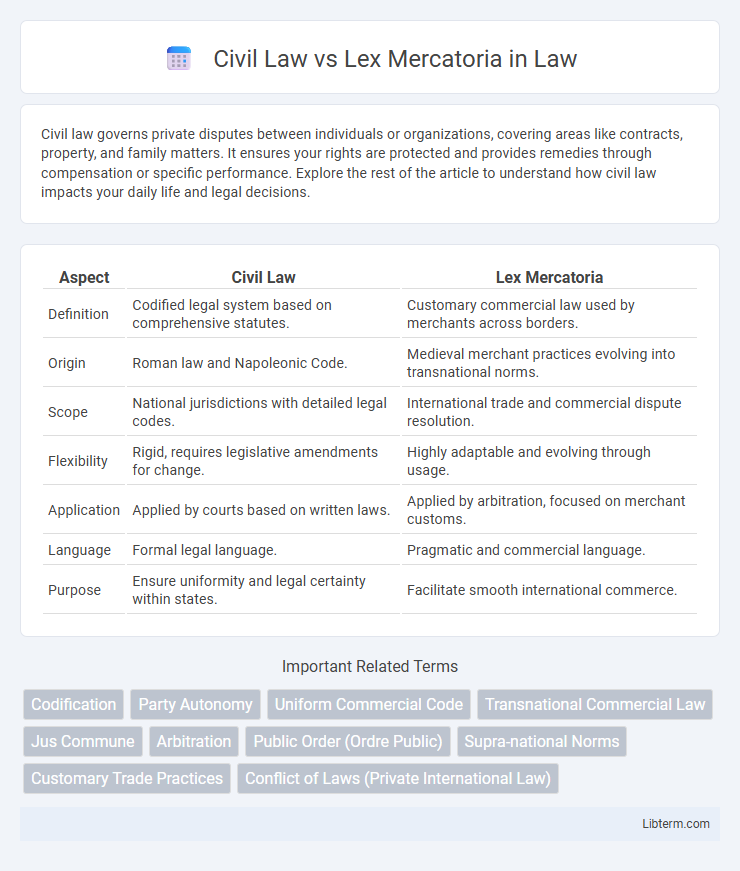Civil law governs private disputes between individuals or organizations, covering areas like contracts, property, and family matters. It ensures your rights are protected and provides remedies through compensation or specific performance. Explore the rest of the article to understand how civil law impacts your daily life and legal decisions.
Table of Comparison
| Aspect | Civil Law | Lex Mercatoria |
|---|---|---|
| Definition | Codified legal system based on comprehensive statutes. | Customary commercial law used by merchants across borders. |
| Origin | Roman law and Napoleonic Code. | Medieval merchant practices evolving into transnational norms. |
| Scope | National jurisdictions with detailed legal codes. | International trade and commercial dispute resolution. |
| Flexibility | Rigid, requires legislative amendments for change. | Highly adaptable and evolving through usage. |
| Application | Applied by courts based on written laws. | Applied by arbitration, focused on merchant customs. |
| Language | Formal legal language. | Pragmatic and commercial language. |
| Purpose | Ensure uniformity and legal certainty within states. | Facilitate smooth international commerce. |
Understanding Civil Law: An Overview
Civil law, rooted in Roman law traditions, serves as a comprehensive legal system governing private relations through codified statutes and principles. It emphasizes written codes, such as the Napoleonic Code and the German Burgerliches Gesetzbuch, offering clear frameworks for contracts, torts, property, and family law. Unlike the flexible, practice-based Lex Mercatoria used in international trade, civil law prioritizes formal legislation and judicial interpretation to ensure predictability and uniformity.
What is Lex Mercatoria?
Lex Mercatoria, also known as the "Law Merchant," is a body of commercial law rules and principles developed by merchants throughout history to govern international trade and resolve disputes without relying solely on national legal systems. It operates as a transnational legal framework emphasizing flexibility, custom, and trade usage, distinct from codified civil law codes. Lex Mercatoria facilitates cross-border commerce by providing uniform standards that complement or override conflicting domestic laws in commercial transactions.
Historical Origins of Civil Law and Lex Mercatoria
Civil Law originated from Roman law principles codified in the Corpus Juris Civilis under Emperor Justinian in the 6th century, forming the foundation for many modern European legal systems. Lex Mercatoria, or the "law merchant," developed during the Middle Ages as a body of customary commercial laws created by merchants to regulate trade across different jurisdictions. While Civil Law is state-based and systematic, Lex Mercatoria emerged organically from merchant practices to facilitate international commerce long before formal codifications.
Key Principles of Civil Law
Civil Law is characterized by codified statutes that provide comprehensive legal frameworks governing private rights and obligations, emphasizing clarity, predictability, and systematic application. Its key principles include the doctrine of legal certainty, the supremacy of codified law, and the importance of written contracts as primary sources of obligation. Enforcement mechanisms are typically state-administered, ensuring adherence through formal judicial procedures and standardized remedies.
Core Features of Lex Mercatoria
Lex Mercatoria, or the "law merchant," comprises a body of commercial law principles developed by merchants across Europe during the medieval period, emphasizing flexibility, party autonomy, and customary practices independent of national legal systems. Core features include its transnational nature, reliance on trade usages, and a dispute resolution framework favoring arbitration over formal court litigation, enabling swift and pragmatic outcomes. It contrasts with Civil Law by prioritizing commercial effectiveness and international consistency rather than rigid codified statutes.
Jurisdiction and Application: Civil Law vs Lex Mercatoria
Civil law systems rely on codified statutes and governmental courts to resolve disputes, with jurisdiction strictly defined by national boundaries and legal authority. Lex Mercatoria, or the law merchant, operates as a transnational set of principles and customs recognized by international commercial parties, often applied through arbitration outside traditional court systems. This flexibility allows Lex Mercatoria to bypass rigid jurisdictional constraints, offering enforceable solutions tailored to global trade.
Differences in Contract Formation and Enforcement
Civil law systems rely heavily on codified statutes and formalities for contract formation, emphasizing written agreements and explicit terms. Lex Mercatoria, or the "law merchant," operates on customary commercial practices and party autonomy, allowing more flexible and informal contract formation through trade usages and industry norms. Enforcement under civil law is typically adjudicated by courts based on statutory provisions, while Lex Mercatoria favors arbitration and consensus-driven dispute resolution rooted in commercial fairness.
Role of Courts and Arbitrators
In Civil Law systems, courts play a central role in interpreting and enforcing codified statutes, with judges applying comprehensive legal codes to resolve disputes. Lex Mercatoria relies heavily on arbitrators who interpret and apply principles derived from international commercial customs and trade usages, allowing for flexible and pragmatic dispute resolution. Courts in Civil Law jurisdictions often defer to arbitral awards grounded in Lex Mercatoria, recognizing the autonomous nature of commercial arbitration.
Advantages and Challenges of Each System
Civil Law offers a comprehensive codification that provides legal certainty and predictability, streamlining dispute resolution through detailed statutes and judicial interpretations. Lex Mercatoria, grounded in international commercial customs and practices, enhances flexibility and adaptability for cross-border trade by prioritizing party autonomy and customary norms. Challenges of Civil Law include rigidity and slower adaptation to global commerce nuances, while Lex Mercatoria faces difficulties in enforceability and inconsistent application across jurisdictions.
Choosing Between Civil Law and Lex Mercatoria in International Disputes
Choosing between Civil Law and Lex Mercatoria in international disputes hinges on the nature of the parties involved and the desired legal framework. Civil Law provides codified statutes and predictability grounded in national jurisdictions, while Lex Mercatoria offers flexibility through transnational commercial customs and principles. Arbitration often favors Lex Mercatoria for its adaptability and neutrality, contrasting with Civil Law's structured procedural rules and formal requirements.
Civil Law Infographic

 libterm.com
libterm.com